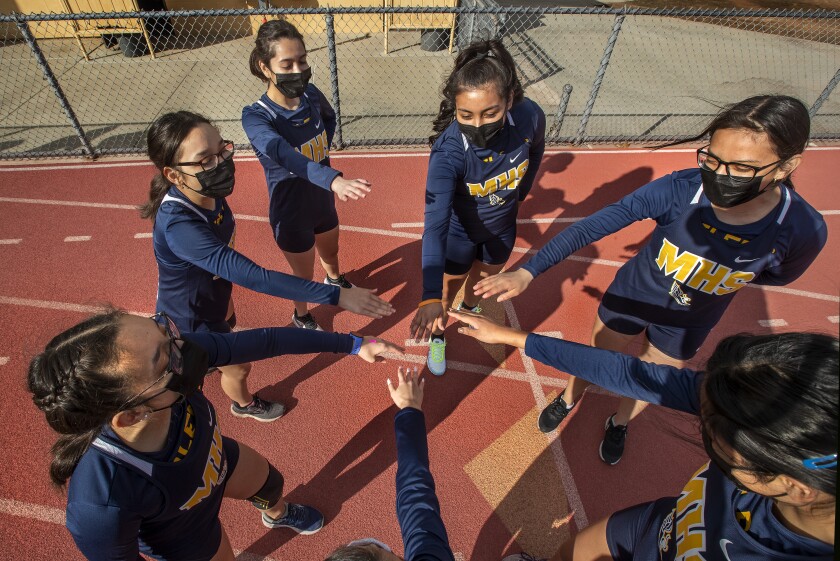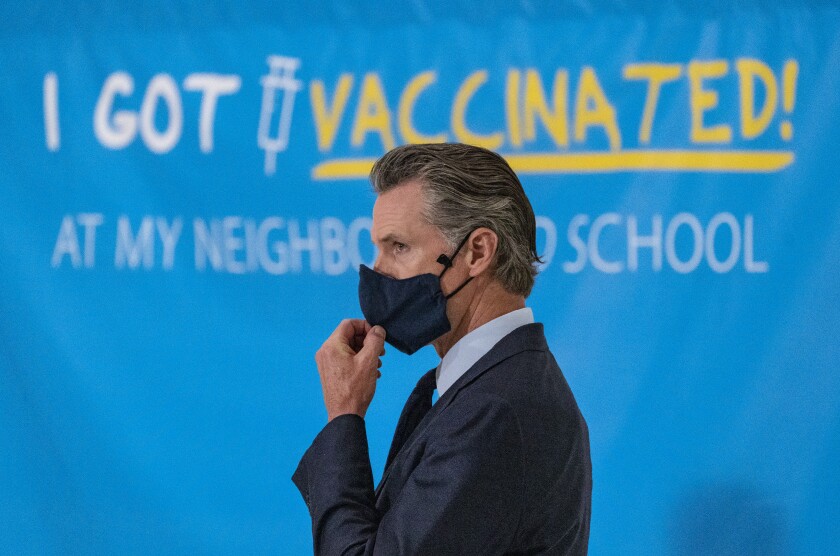
Because the coronavirus attacked our lives 15 months earlier, we have actually been on a psychological journey that took us through seclusion and anguish, anger and sorrow.
A few of us felt envy when others got immunized prior to us, others came across stress and anxiety as the constraints that kept us safe for a year were gradually raised.
Now, as we get ready for a complete resuming in California on June 15, we should challenge yet another psychological obstacle: our determination to trust others.
” Trust is most likely the most crucial active ingredient in a society,” stated Peter Kim, a teacher of management and company at USC. “It’s what permits us to participate in every sort of social, financial and cultural interaction we have in the world.”
Trust is broadly specified as a determination to make oneself susceptible in circumstances including threat, stated Kim, who is composing a book on the topic.
” The danger aspect needs to exist,” he stated. “If there is no threat, there is no other way to show trust since there is no drawback.”

Members of the Montebello High School cross-country group prevent touching hands at a March satisfy, an example of habits customized throughout the pandemic.
( Mel Melcon/ Los Angeles Times)
The possibilities of getting COVID-19 will not be absolutely no anytime quickly– even for immunized individuals. For all of us to easily return to in-person work, send our kids to school and desert our masks, we will have to rely on numerous lines of trust.
- Trust that the vaccines are safe and work along with the research study recommends.
- Trust that individuals we connect with are immunized or securing themselves in other methods.
- Trust that when federal government leaders state it is safe to eliminate our masks, or store in congested shops, that they are encouraged by science, not politics.
” Trust will definitely impact how successfully we handle the healing procedure,” Kim stated.
Regrettably, Americans’ desire to rely on one another was currently in decrease prior to the pandemic started.
In 2019 the Bench Proving Ground discovered that 71%of Americans believed social self-confidence has actually gotten worse in the past 20 years, and 49?lieved their fellow residents were not as reputable as they had actually remained in the past.
At the very same time, three-quarters of Americans stated our rely on the federal government had actually diminished.
Nevertheless, a more regional study performed in January of this year discovered rely on abundance.
Popular opinion information gathered by the Center for the Research Study of Los Angeles at Loyola Marymount University discovered that 74%of Angelenos rely on the clinical neighborhood “to do what’s right,” while 70%trust the Centers for Illness Control and Avoidance to do the exact same. 69%of participants stated they rely on the Los Angeles County Department of Public Health.
” Rely on the clinical neighborhood has actually grown over the previous year from 65%in 2020 to 74%in 2021,” stated Brianne Gilbert, associate director for the center who co-led the work.
Those high levels of trust were discovered throughout a wide variety of earnings levels and other demographics, although individuals who determined as Black and politically conservative were a little less most likely to feel rely on clinical and public health organizations, she stated.

L.A. County Public Health Director Barbara Ferrer keeps an eye on individuals after they get their vaccines in Downey in March.
( Francine Orr/ Los Angeles Times)
Lorraine Hamblin, 74, of Porter Cattle ranch stated she relied on suggestions from health authorities such as Dr. Anthony Fauci and Barbara Ferrer, L.A. County’s public health director, along with supported the lots of limitations that were put in location throughout the county and the state throughout the pandemic.
And yet, although she’s been totally immunized for months, she’s not persuaded that it’s safe to go back to her old lifestyle.
She still uses a mask whenever she leaves her house, even simply to stroll the canine.
” It’s not completely guaranteed that the vaccine will last permanently, plus I do not wish to contaminate anybody else,” she stated.
She likewise discovers it tough to trust political leaders who state it is safe for the state to open on June 15.
” I like Gov. Newsom quite, however I believe he’s catering the pressure from his constituents,” she stated. “I will still use a mask up until I myself make certain that the pandemic has actually been dominated. I believe they are disregarding some crucial truths we do not have yet.”

Gov. Gavin Newsom, displayed in May, has actually revealed that California will totally resume on June 15.
( Damian Dovarganes/ Associated Press)
Hamblin stated she will not go back to her pre-pandemic life till there is a high vaccination rate– possibly 90%– in addition to a couple of years of information that show the vaccines really carry out as assured. She ‘d likewise like to see case rates, currently falling in the county, plunge even more, and much better treatments for those who do get ill with from the infection.
Dr. Monica Gandhi, a teacher of medication at UC San Francisco, anticipates that lots of people throughout the state will feel the exact same method.
In her viewpoint, fear-based messaging and complicated declarations from California’s public health leaders have actually made it hard for citizens to rely on that they might ever go back to living usually.
” We informed individuals insane things, like you can go to a shopping center that’s at 20?pability and be around individuals you do not understand, however you can’t stroll outdoors with another member of a various family,” Gandhi stated. “That’s a significant contradiction.”
She’s likewise annoyed that health authorities at the state and nationwide levels did not promote a more positive message about the efficiency of vaccines when they initially appeared.
After a year of being informed that any direct exposure to other individuals provides a major danger of infection, Gandhi marvels the number of Californians will want to return to life as regular on June15
” It’s such an about-face,” she stated. “Which can not produce trust.”
On a nationwide scale, Odis Johnson, executive director of the Johns Hopkins Center for Safe and Healthy Schools, stated political polarization and occasions such as the storming of the Capitol by Trump advocates even more wore down the trust Americans have in one another.
” What occurred on Jan. 6 laid the field for us to question a variety of things, consisting of whether our next-door neighbors and schoolmates will truly keep our benefits in mind by sticking to the CDC’s standards and suggestions,” he stated.
In addition, the time out in administration of the Johnson & Johnson vaccine and irregular messaging around all the vaccines has actually likewise made it difficult for lots of people to rely on the shots are safe and efficient, he stated.
” Today, we have a great deal of voices that are not speaking the very same language,” Johnson stated. “We have regional requireds, state requireds and the CDC assistance, and typically the regional requireds are the strictest.”
So how to develop trust provided all that? Constant interaction, he stated.
” If everybody was on the exact same page, then possibly individuals would not see vaccines and security preventative measures as a political department and ideological divide,” he stated.
Emily Brunson, a medical anthropologist at Texas State University, stated trust concerns are unavoidable in a pandemic, however they were intensified in the United States due to the fact that we entered this one very divided politically and socially.
” If you were to return even 10 years in the U.S., we would not remain in the fractured state we remain in now,” she stated.
There have actually been other difficulties. Brunson kept in mind that lots of people still do not rely on the CDC’s assistance on COVID-19, in part due to the fact that the company did a bad task describing why it at first stated masks were not required for many people, and after that altered course a couple of weeks later on.
” What required to be transparent at that time is that this infection was actually brand-new, and there were going to be unknowns due to the fact that they didn’t comprehend specific aspects of it yet,” she stated. “They were not omniscient and they need to have interacted that.”
If CDC authorities had actually made it more clear to Americans that they were learning more about the infection in genuine time, which assistance would most likely move, individuals might have felt less baffled and upset when the firm altered its standards, she stated.
” Details processing is something we do incorrect extremely frequently.”
Isabelle Brocas, USC financial expert who studies choice making
The difficulty of structure trust is intensified by another aspect– health authorities can not simply count on truths and information, stated Isabelle Brocas, an economic expert at USC who studies choice making.
That’s due to the fact that human beings are hard-wired to process brand-new details in manner ins which support their formerly held viewpoints, she discussed.
” Details processing is something we do incorrect really frequently,” Brocas stated.
For instance, a current research study discovered simply 0.03%of totally immunized individuals in L.A. County have actually contracted the infection after being vaccinated. Researchers and public health employees may see that as proof that the vaccines are extremely efficient. Somebody who does not trust vaccines might translate that exact same information as verifying their belief that the shots are not 100%reliable.
” New info will not do much to bring individuals together if their preliminary viewpoints are not lined up,” Brocas stated. “If they begin far, they will remain far.”
Getting individuals to rely on one another once again will be difficult, Brocas stated.
” It is tough to understand how to pull out of it,” she stated. “It may simply take some time, and gradually, things alter.”
Eileen Ybarra, 43, concurs.
The curator, who resides in Glendale, stated she trusts that regional leaders are not acting recklessly by loosening up limitations.
Column One
A display for engaging storytelling
from the Los Angeles Times.
” From what I comprehend, the constraints existed to avoid medical facility collapse which’s not an issue anymore,” she stated. “At this moment, because a lot of the remainder of the nation has actually opened, it’s more difficult and more difficult for us to remain closed.”
However after investing the majority of the pandemic in the house in her home– keeping away from loved ones and having actually requirements provided to her door, Ybarra stated she’ll require some more time to relieve back into activities that she understands intellectually are most likely great.
” I feel a lot more secure than I did prior to I was immunized, however I’m not rather all set to do whatever I did previously,” she stated.
Eventually, nevertheless, she will wish to challenge herself. Her birthday remains in late July and she intends to feel safe consuming at an indoor dining establishment already.
She has actually currently purchased tickets to 2 performances for the fall.
Fingers crossed, she’ll trust it’s safe to see a program already.
No comments:
Post a Comment